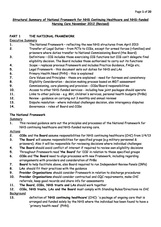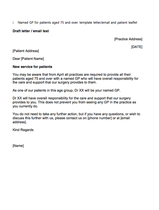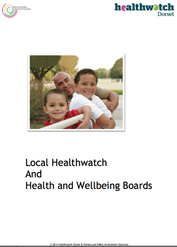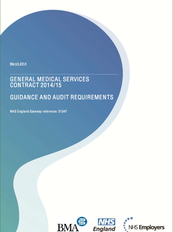NEWS - APRIL 2014
MONITOR TO DISSOLVE CO-OPERATION AND COMPETITION PANEL
Monitor is dissolving its Co-operation and Competition Panel - the body which advises it on competition issues, the regulator has announced.
Monitor is dissolving its Co-operation and Competition Panel - the body which advises it on competition issues, the regulator has announced.
PAYMENTS BETWEEN NHS BODIES AND LOCAL AUTHORITIES
Response to question from:
Ruth Marsden (HAPIA North) from Kirsty McCaffery, Social Care Finance and Strategy Advisor, Department of Health
Question
Are funds (payments between NHS bodies and LAs) thus transferred 'ring-fenced'/protected, or could they be 'redirected' to peripheral and tangential matters?
________________________________________________________________________________________________________________
Response
The funding is split into two streams: the main allocation and the integration allocation. The explanatory note outlines the usage of this money, which are highlighted below:
Main:
The funding must be used to support adult social care services in each local authority, which also has a health benefit (see Direction 3(1) and (2)). However, beyond this broad condition, the Department wants to provide flexibility for local areas to determine how this investment in social care services is best used.
The Directions make it a condition of the transfer that the local authority agrees with its local clinical commissioning groups how the funding is best used within social care, and the outcomes expected from this investment (see Direction 4(2)). Health and Wellbeing boards will be the natural place for discussions between NHS England, clinical commissioning groups and local authorities on how the funding should be spent, as part of their wider discussions on the use of their total health and care resources.
The Directions make it a condition of the transfer that local authorities and clinical commissioning groups have regard to the Joint Strategic Needs Assessment for their local population, and existing commissioning plans for both health and social care, in how the funding is used (see Direction 4(3)).
The Directions also make it a condition of the transfer that local authorities must be able to demonstrate how the
funding transfer will improve social care services, and outcomes for service users.
Integration:
In relation to the integration payment, the Directions make it a condition of the transfer that the local authority must agree with its partner clinical commissioning group a plan for establishing and maintaining a Better Care Fund pooled budget in the financial year 2015/16, and that the integration payment must be used for purposes related to preparing for implementing the Better Care Fund (see Direction 5).
These funds are, therefore, ring-fenced. i.e. the main part must be used to support adult social care services in each local authority, which also has a health benefit and the integration part must be used for purposes related to preparing for implementing the BCF. In addition to the other conditions listed above.
Response to question from:
Ruth Marsden (HAPIA North) from Kirsty McCaffery, Social Care Finance and Strategy Advisor, Department of Health
Question
Are funds (payments between NHS bodies and LAs) thus transferred 'ring-fenced'/protected, or could they be 'redirected' to peripheral and tangential matters?
________________________________________________________________________________________________________________
Response
The funding is split into two streams: the main allocation and the integration allocation. The explanatory note outlines the usage of this money, which are highlighted below:
Main:
The funding must be used to support adult social care services in each local authority, which also has a health benefit (see Direction 3(1) and (2)). However, beyond this broad condition, the Department wants to provide flexibility for local areas to determine how this investment in social care services is best used.
The Directions make it a condition of the transfer that the local authority agrees with its local clinical commissioning groups how the funding is best used within social care, and the outcomes expected from this investment (see Direction 4(2)). Health and Wellbeing boards will be the natural place for discussions between NHS England, clinical commissioning groups and local authorities on how the funding should be spent, as part of their wider discussions on the use of their total health and care resources.
The Directions make it a condition of the transfer that local authorities and clinical commissioning groups have regard to the Joint Strategic Needs Assessment for their local population, and existing commissioning plans for both health and social care, in how the funding is used (see Direction 4(3)).
The Directions also make it a condition of the transfer that local authorities must be able to demonstrate how the
funding transfer will improve social care services, and outcomes for service users.
Integration:
In relation to the integration payment, the Directions make it a condition of the transfer that the local authority must agree with its partner clinical commissioning group a plan for establishing and maintaining a Better Care Fund pooled budget in the financial year 2015/16, and that the integration payment must be used for purposes related to preparing for implementing the Better Care Fund (see Direction 5).
These funds are, therefore, ring-fenced. i.e. the main part must be used to support adult social care services in each local authority, which also has a health benefit and the integration part must be used for purposes related to preparing for implementing the BCF. In addition to the other conditions listed above.
COMPLAINTS HANDLING IS A 'TOXIC COCKTAIL' SAYS PARLIAMENT
Complaints about the NHS, and the handling of those complaints, were described by the Parliamentary and Health Service Ombudsman as a 'toxic cocktail', a combination of a reluctance on the part of citizens 'to express their concerns or complaints', and a defensiveness on the part of services 'to hear and address concerns'.
Public Administration Committee Report was ordered by the House of Commons to be printed 26 March 2014.
http://www.publications.parliament.uk/pa/cm201314/cmselect/cmpubadm/229/22902.htm
Complaints about the NHS, and the handling of those complaints, were described by the Parliamentary and Health Service Ombudsman as a 'toxic cocktail', a combination of a reluctance on the part of citizens 'to express their concerns or complaints', and a defensiveness on the part of services 'to hear and address concerns'.
Public Administration Committee Report was ordered by the House of Commons to be printed 26 March 2014.
http://www.publications.parliament.uk/pa/cm201314/cmselect/cmpubadm/229/22902.htm
CQC CONSULTATION: HOW WE REGULATE, INSPECT AND RATE SERVICES
We're changing the way we regulate, inspect and rate health and care services. Please tell us what you think of our plans.
Between Wednesday 09 April and Wednesday 04 June 2014, we want to find out what people think about how we are planning to change the way we regulate, inspect and rate care services. The changes include:
Topics within the document cover:
We're changing the way we regulate, inspect and rate health and care services. Please tell us what you think of our plans.
Between Wednesday 09 April and Wednesday 04 June 2014, we want to find out what people think about how we are planning to change the way we regulate, inspect and rate care services. The changes include:
- What we look at on an inspection
- How we judge what 'good' care looks like
- How we rate care services to help you judge and choose care if you want to
- How we use information to help us decide when and where we inspect
Topics within the document cover:
- Read about planned changes
- Handbooks
- Hospitals
- General Practice
- Adult Social Care
- Human Rights
- What changes are we proposing?
- How we develop the changes
- Get involved ...
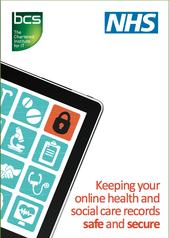
KEEPING YOUR ONLINE HEALTH AND SOCIAL CARE RECORDS SAFE AND SECURE
Guide produced by BCS, The Chartered Institute of IT and the Department of Health - 11 pages
In 2015, everyone in England will have access to their GP medical records online. Many other health and social care organisations are providing access to records too, and some people are creating their own health records online.
Your records contain personal information, so it is important to keep them safe. You should take the same care with your health and social care records as you do if you use online banking. This guide explains how to access your records safely, keep them secure, and share them safely, if you choose to.
Guide produced by BCS, The Chartered Institute of IT and the Department of Health - 11 pages
In 2015, everyone in England will have access to their GP medical records online. Many other health and social care organisations are providing access to records too, and some people are creating their own health records online.
Your records contain personal information, so it is important to keep them safe. You should take the same care with your health and social care records as you do if you use online banking. This guide explains how to access your records safely, keep them secure, and share them safely, if you choose to.
WHICH HEALTHCARE FOR NHS NEEDS TO BE LICENSED
All providers of health care services for the purposes of the NHS need a Monitor licence from 1 April 2014, unless exempt.
The following providers are exempt:
In the event that the services are designated as Commissioner Requested Services [CRSs] then the first four exemptions are over-ridden by this designation and the provider must hold a licence.
Please note: providers do not need a licence to bid for NHS-funded services, but are required to hold a licence from 1 April 2014 (if they are not exempt).
All providers of health care services for the purposes of the NHS need a Monitor licence from 1 April 2014, unless exempt.
The following providers are exempt:
- Providers not required to register with the Care Quality Commission, unless they provide Commissioner Requested Services;
- Small providers of NHS-funded health care services whose annual turnover from the provision of NHS services is less than £10 million;
- Providers of primary medical and dental services (eg GPs or dentists who do not provide any other NHS services);
- Providers of NHS continuing health care and NHS-funded nursing care (eg care homes who provide no other NHS health care services);
- NHS Trusts (which will only be licensed upon authorisation as an NHS Foundation Trust).
In the event that the services are designated as Commissioner Requested Services [CRSs] then the first four exemptions are over-ridden by this designation and the provider must hold a licence.
Please note: providers do not need a licence to bid for NHS-funded services, but are required to hold a licence from 1 April 2014 (if they are not exempt).
|
NAMED GPs FOR THE OVER 75s
|
The template letter that GPs should use to inform their patients over 75 years that they have a 'named GP'.
|
BULLETIN FOR CCGs - Issue 56 - Gateway Reference: 01458
The latest bulletin from NHSE is at http://www.england.nhs.uk/wp-content/uploads/2014/04/ccg-bulletin-issue-56-03042014.pdf
A new settlement for health and social care - interim report
In this King's Fund report, the commission explains why it believes England needs a single health and social care system, with a ring-fenced, singly commissioned budget, and more closely aligned entitlements. Drawing on accounts from patients and their families, the it argues that the current system is no longer fit for purpose.
http://www.kingsfund.org.uk/sites/files/kf/field/field_publication_file/commission-interim-new-settlement-health-social-care-apr2014.pdf
An alternative guide to the urgent and emergency care system in England
A&E is often seen as a service in crisis and is the focus of much media and political interest. But A&E is just the tip of the iceberg – the whole urgent and emergency care system is complex, and surrounded by myth and confusion. This King's Fund new animation gives a whistle-stop tour of how the system fits together and busts some myths about what’s really going on – explaining that the underlying causes go much deeper than just A&E and demand a joined-up response across all services.
http://www.kingsfund.org.uk/projects/urgent-emergency-care/alternative-guide-urgent-and-emergency-care-system-England
General medical services contract 2014/15: guidance and audit requirements
This document provides guidance and support for enhanced services in order to avoid unplanned admissions. Healthwatches working with PPGs may find the section from page 48 useful.http://www.nhsemployers.org/SiteCollectionDocuments/GMS-contract-guidance-audit-requirements-2014-15.pdf
Congenital Heart Disease Review
John Holden's 21st update is at http://www.england.nhs.uk/2014/04/08/john-holden-21/
The latest bulletin from NHSE is at http://www.england.nhs.uk/wp-content/uploads/2014/04/ccg-bulletin-issue-56-03042014.pdf
A new settlement for health and social care - interim report
In this King's Fund report, the commission explains why it believes England needs a single health and social care system, with a ring-fenced, singly commissioned budget, and more closely aligned entitlements. Drawing on accounts from patients and their families, the it argues that the current system is no longer fit for purpose.
http://www.kingsfund.org.uk/sites/files/kf/field/field_publication_file/commission-interim-new-settlement-health-social-care-apr2014.pdf
An alternative guide to the urgent and emergency care system in England
A&E is often seen as a service in crisis and is the focus of much media and political interest. But A&E is just the tip of the iceberg – the whole urgent and emergency care system is complex, and surrounded by myth and confusion. This King's Fund new animation gives a whistle-stop tour of how the system fits together and busts some myths about what’s really going on – explaining that the underlying causes go much deeper than just A&E and demand a joined-up response across all services.
http://www.kingsfund.org.uk/projects/urgent-emergency-care/alternative-guide-urgent-and-emergency-care-system-England
General medical services contract 2014/15: guidance and audit requirements
This document provides guidance and support for enhanced services in order to avoid unplanned admissions. Healthwatches working with PPGs may find the section from page 48 useful.http://www.nhsemployers.org/SiteCollectionDocuments/GMS-contract-guidance-audit-requirements-2014-15.pdf
Congenital Heart Disease Review
John Holden's 21st update is at http://www.england.nhs.uk/2014/04/08/john-holden-21/
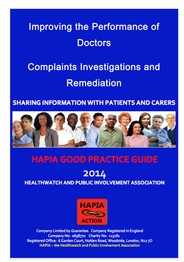
COMPLAINTS AGAINST DOCTORS - SHARING INFORMATION WITH PATIENTS AND CARERS
Improving the Performance of Doctors
HAPIA GOOD PRACTICE GUIDE - 2014
18 pages
Improving the Performance of Doctors
HAPIA GOOD PRACTICE GUIDE - 2014
18 pages
LEGAL OBLIGATIONS OF GPs TO PATIENTS
https://www.gov.uk/government/publications/nhs-primary-medical-services-directions-2013
These directions relate to the NHS Primary Medical Services Regulations, which came into force from 1 April 2013. As well as being a useful resource for GPs who work under contract to the NHS, they will be of interest to patients who wish to understand the legal obligations of GPs to their patients.
https://www.gov.uk/government/publications/nhs-primary-medical-services-directions-2013
These directions relate to the NHS Primary Medical Services Regulations, which came into force from 1 April 2013. As well as being a useful resource for GPs who work under contract to the NHS, they will be of interest to patients who wish to understand the legal obligations of GPs to their patients.
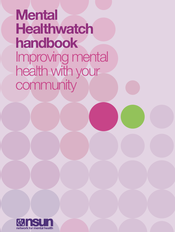
MENTAL HEALTH SERVICE USERS NETWORK - HANDBOOK FOR HEALTHWATCH
18 pages
This handbook provides information on how Healthwatch can help improve mental health with a range of partners including central government, service users, commissioners, providers, the voluntary sector and councils.
18 pages
This handbook provides information on how Healthwatch can help improve mental health with a range of partners including central government, service users, commissioners, providers, the voluntary sector and councils.
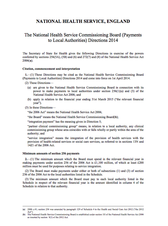
PAYMENTS TRANSFERS FROM NHS TO SOCIAL CARE - WHO GETS WHAT!
7 pages
See the table at the end - pages 4 - 7
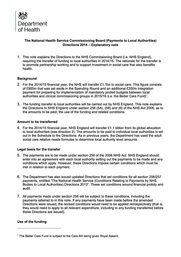
EXPLANATORY NOTE FOR THE 2014 TRANSFER OF FUNDS FROM THE NHS TO LOCAL AUTHORITIES - 3 pages
This note explains the Directions to the NHS Commissioning Board (i.e. NHS England), requiring the transfer of funding to local authorities in 2014/15. The rationale for the transfer is to promote partnership working and to support investment in social care that also benefits health.
This note explains the Directions to the NHS Commissioning Board (i.e. NHS England), requiring the transfer of funding to local authorities in 2014/15. The rationale for the transfer is to promote partnership working and to support investment in social care that also benefits health.
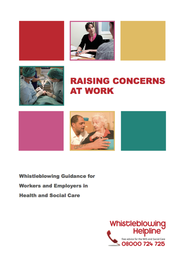
WHISTLEBLOWING - NEW GUIDANCE
Raising Concerns at Work: Whistleblowing Guidance for Workers and Employers in Health and Social Care - 44 pages
Raising concerns about poor practice, as part of people’s day-to day work, should be the norm. That’s the message in new guidance that’s been launched this week, providing support for health and social care staff and managers over whistleblowing.
There are a number of key recommendations, to help make whistleblowing an important part of improving the quality of service user support and patient safety. From an employer’s viewpoint, whistleblowing can be an opportunity to stop poor practice at an early stage, before it becomes normalised. For the worker, the freedom to raise concerns without fear means that they can go ahead and ‘do the right thing’.
Raising Concerns at Work: Whistleblowing Guidance for Workers and Employers in Health and Social Care - 44 pages
Raising concerns about poor practice, as part of people’s day-to day work, should be the norm. That’s the message in new guidance that’s been launched this week, providing support for health and social care staff and managers over whistleblowing.
There are a number of key recommendations, to help make whistleblowing an important part of improving the quality of service user support and patient safety. From an employer’s viewpoint, whistleblowing can be an opportunity to stop poor practice at an early stage, before it becomes normalised. For the worker, the freedom to raise concerns without fear means that they can go ahead and ‘do the right thing’.
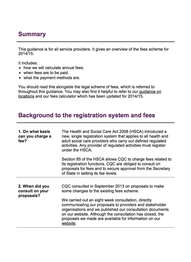
CQC FEES - WHO PAYS FOR WHAT
19 pages
This guidance is for all service providers. It gives an overview of the fees scheme for 2014/15.
It includes:
• How we will calculate annual fees.
• When fees are to be paid.
• What the payment methods are.
You should read this alongside the legal scheme of fees, which is referred to throughout this guidance. You may also find it helpful to refer to our guidance on locations and our fees calculator which has been updated for 2014/15.
19 pages
This guidance is for all service providers. It gives an overview of the fees scheme for 2014/15.
It includes:
• How we will calculate annual fees.
• When fees are to be paid.
• What the payment methods are.
You should read this alongside the legal scheme of fees, which is referred to throughout this guidance. You may also find it helpful to refer to our guidance on locations and our fees calculator which has been updated for 2014/15.
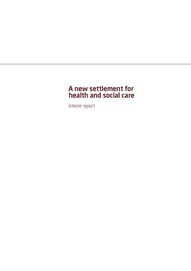
NEED FOR A SINGLE SYSTEM - HEALTH AND SOCIAL CARE
86 pages
This is the interim report from the independent Commission on the Future of Health and Social Care in England. In it, the commission explains why it believes England needs a single health and social care system, with a ring-fenced, singly commissioned budget, and more closely aligned entitlements. Drawing on accounts from patients and their families, the commission argues that the current system is no longer fit for purpose.
At the root of the problem is a lack of alignment in funding, organisation and entitlement. The report analyses the historical divides between the two systems, the effects of our ageing society, and issues of affordability, before exploring options for change in meeting the costs ahead. It concludes with a call for responses to these options.
86 pages
This is the interim report from the independent Commission on the Future of Health and Social Care in England. In it, the commission explains why it believes England needs a single health and social care system, with a ring-fenced, singly commissioned budget, and more closely aligned entitlements. Drawing on accounts from patients and their families, the commission argues that the current system is no longer fit for purpose.
At the root of the problem is a lack of alignment in funding, organisation and entitlement. The report analyses the historical divides between the two systems, the effects of our ageing society, and issues of affordability, before exploring options for change in meeting the costs ahead. It concludes with a call for responses to these options.
SERVICES FOR THE DEAF
8 pages
8 pages
- Lord Hunt of Kings Heath - Labour
- Lord Addington - Liberal Democrat
- Baroness Jolly - Liberal Democrat
INFORMATION ALONE IS NOT ENOUGH - IT MUST BE USED
Collecting data on patient experience is not enough: they must be used to improve care.
The NHS has been collecting data on patients’ experience of care for over 10 years but the information is often ignored.
bmj.com today, Angela Coulter, Associate Professor at Oxford University and colleagues argue that this is “unethical” and call for a co-ordinated approach to use the information to help improve services.
Click here to read further ...
Collecting data on patient experience is not enough: they must be used to improve care.
The NHS has been collecting data on patients’ experience of care for over 10 years but the information is often ignored.
bmj.com today, Angela Coulter, Associate Professor at Oxford University and colleagues argue that this is “unethical” and call for a co-ordinated approach to use the information to help improve services.
Click here to read further ...
RAIDING THE PUBLIC HEALTH BUDGET
Ring-fenced funds to promote public health are being diverted to wider council services such as social care and housing to plug gaps caused by Government cuts, finds a BMJ investigation today.
Click here to read further ...
Ring-fenced funds to promote public health are being diverted to wider council services such as social care and housing to plug gaps caused by Government cuts, finds a BMJ investigation today.
Click here to read further ...
LAW COMMISSION'S REVIEW OF HEALTH AND SOCIAL CARE PROFESSIONAL REGULATIONS
Letter from: Tim Spencer-Lane, Public Law Team, Law Commission
The Law Commissions' Report and a draft Bill on the regulation of health and social care professionals will be published on Wednesday, 02 April 2014.
The Report will set out a new single legal framework for the regulation of all health and social care professionals, including doctors, dentists, nurses and pharmacists. The reforms aim to sweep away the out-dated and inflexible decision-making processes associated with the current legislation. It will introduce a clear and consistent legal framework which is needed to enable the regulators to uphold their duty to protect the public.
Please do contact me if you have any queries.
Tel: 020 3334 3758
Fax: 020 3334 0201
EM: tim.spencer-lane@lawcommission.gsi.gov.uk
Web: www.lawcom.gov.uk
Letter from: Tim Spencer-Lane, Public Law Team, Law Commission
The Law Commissions' Report and a draft Bill on the regulation of health and social care professionals will be published on Wednesday, 02 April 2014.
The Report will set out a new single legal framework for the regulation of all health and social care professionals, including doctors, dentists, nurses and pharmacists. The reforms aim to sweep away the out-dated and inflexible decision-making processes associated with the current legislation. It will introduce a clear and consistent legal framework which is needed to enable the regulators to uphold their duty to protect the public.
Please do contact me if you have any queries.
Tel: 020 3334 3758
Fax: 020 3334 0201
EM: tim.spencer-lane@lawcommission.gsi.gov.uk
Web: www.lawcom.gov.uk

